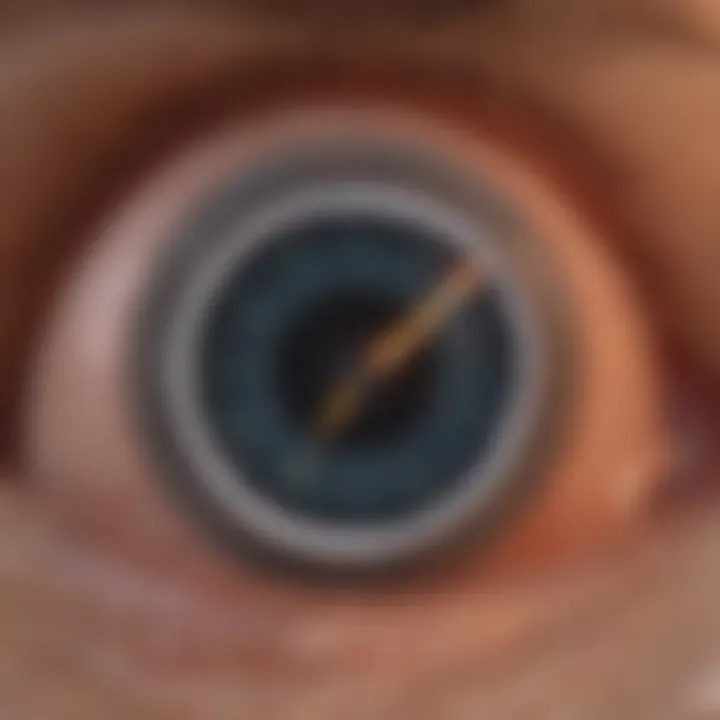TRT and Insomnia: Understanding Their Connection


Intro
Testosterone Replacement Therapy (TRT) is a medical treatment that involves restoring testosterone levels in men who suffer from low testosterone. This therapy is often sought to improve various physical and psychological symptoms. However, the relationship between TRT and insomnia is not straightforward. Evidence suggests that changes in hormone levels can impact sleep architecture and quality. Understanding these complexities is crucial for both health professionals and individuals navigating this treatment.
The purpose of this article is to provide a thorough exploration of TRT and its potential relationship with insomnia. This involves examining how TRT may influence sleep patterns, assessing its benefits and risks, and discussing effective management strategies for sleep disturbances during therapy. As research continues to evolve, a clearer picture of this interplay is emerging, which warrants careful consideration for anyone involved in TRT.
Foreword to Testosterone Replacement Therapy
Testosterone Replacement Therapy (TRT) is a medical intervention aimed at restoring normal testosterone levels in individuals, particularly men, experiencing the effects of low testosterone. This topic is crucial due to its implications on overall health, especially related to sleep. Understanding TRT can illuminate how hormone levels affect many bodily functions, including sleep quality. This article delves into various aspects of TRT and its connection with insomnia, offering insights that are particularly relevant for patients, healthcare providers, and researchers.
Definition of TRT
Testosterone Replacement Therapy is a treatment designed to replace or supplement testosterone levels in men who have been diagnosed with hypogonadism or other conditions causing low testosterone. This therapy can be administered through several methods, including injections, skin patches, and gels. The primary goal of TRT is to alleviate symptoms related to testosterone deficiency, which may include fatigue, decreased libido, mood changes, and cognitive impairments.
TRT not only addresses these symptoms but also has potential effects on metabolic health, muscle mass, and bone density. Therefore, a clear understanding of TRT is essential for making informed decisions regarding its use and implications for overall health.
Indications for TRT
The decision to initiate TRT is often based on a range of clinical indications, predominantly focusing on the following:
- Clinical Symptoms: Issues such as fatigue, depression, reduced sexual desire, and erectile dysfunction are common indicators of low testosterone levels.
- Blood Measurement: Diagnosis typically involves blood tests showing consistently low testosterone levels. This usually is confirmed with tests taken in the morning.
- Age-Related Decline: Many men experience a natural decline in testosterone with age, often referred to as andropause, compelling some to seek therapy.
- Other Medical Conditions: Conditions like obesity, diabetes, and chronic illnesses may also warrant consideration for TRT.
"Receiving appropriate testosterone replacement can significantly improve quality of life for many men suffering from low testosterone symptoms."
Overall, understanding the criteria for administering TRT is crucial, especially when considering its potential effects on sleep. The relationship between testosterone levels and sleep disturbances opens a pathway for exploring TRT as a therapeutic option for insomnia.
Understanding Insomnia
Understanding insomnia is crucial in the broader context of testosterone replacement therapy (TRT) because it reveals the nuances of how hormonal treatments can affect sleep patterns. Insomnia, characterized by difficulty in falling or staying asleep, can lead to far-reaching consequences on mental and physical health. This section aims to dissect the definition of insomnia and explore its relevance to men considering TRT, providing insight into the implications of sleep disorders on overall well-being.
Definition and Types of Insomnia
Insomnia is a sleep disorder marked by persistent issues in sleep initiation, maintenance, or quality. It can be categorized into two main types: acute and chronic. Acute insomnia is short-term and often tied to stressful events, while chronic insomnia lasts for at least three months and can occur at least three times per week.
Types of Insomnia include:
- Onset Insomnia: Trouble falling asleep at the beginning of the night.
- Maintenance Insomnia: Waking up during the night and having difficulty returning to sleep.
- Terminal Insomnia: Waking up too early and being unable to go back to sleep.
By classifying insomnia, healthcare providers can tailor interventions more effectively. Understanding the type of insomnia can guide the choice of treatment options, which is especially important in the context of TRT, where hormonal balances may play a role in the quality of sleep.
Prevalence of Insomnia in Men
Insomnia is not a trivial issue, especially among men. Research indicates that a notable percentage of men experience some form of insomnia at various stages in life. Roughly one-third of adult men report occasional sleep disturbances, while about 10% suffer from chronic insomnia.
This prevalence can be linked to various factors, including:


- Age: Older men are more likely to experience sleep disturbances.
- Stress and anxiety: These psychological factors often exacerbate sleep difficulties.
- Health conditions: Issues like depression, obesity, and cardiovascular diseases are linked to increased insomnia risk.
Addressing insomnia is necessary for the successful management of TRT. If a sleeping disorder is present, it may complicate the treatment process, leading to suboptimal outcomes. Understanding the extent and nature of insomnia in men allows healthcare providers to develop comprehensive treatment plans that address both hormone therapy and sleep issues.
Mechanisms of Sleep
Understanding the mechanisms of sleep is crucial when discussing the relationship between testosterone replacement therapy (TRT) and insomnia. Sleep is not merely a passive state but an active process regulated by numerous biological functions and environmental factors. It plays a significant role in physical health, mental well-being, and hormone regulation. A detailed insight into mechanisms of sleep will help elucidate how TRT may influence sleep quality and overall health.
The Role of Hormones in Sleep Regulation
Hormones are vital in maintaining sleep patterns. Various hormones such as melatonin, cortisol, and testosterone, work in coordination to regulate different sleep stages. Melatonin, for example, signals the body to prepare for sleep, while cortisol helps regulate the wake-sleep cycle.
Testosterone’s role is not entirely straightforward. Low testosterone levels are directly linked to sleep disturbances and increased levels of insomnia. Various studies indicate that testosterone can influence sleep by modulating the hypothalamic-pituitary-gonadal (HPG) axis, thereby affecting the secretion of many other hormones involved in sleep regulation.
- Testosterone helps increase the amount of deep sleep, which is essential for restorative sleep.
- It also influences REM sleep, possibly affecting dreams and overall psychological well-being.
"Understanding hormonal balance is essential in deciphering sleep disorders and developing effective treatment strategies"
Impact of Testosterone on Sleep Architecture
Testosterone not only affects sleep duration but also alters the architecture of sleep. Sleep architecture refers to the structure of sleep cycles, including the transitions between REM and non-REM sleep stages.
Research shows that increased testosterone levels can lead to improvements in sleep quality. Specifically, studies reveal that men undergoing TRT often report:
- Increased total sleep time
- Enhanced sleep efficiency
- Higher percentage of deep sleep compared to their baseline levels
However, this positive impact is not uniform across all individuals. Some may experience adverse effects, such as sleep apnea or disruptions in REM sleep. For instance, specific studies indicated that while testosterone might enhance overall sleep, it may also worsen respiratory-related sleep disorders, demonstrating the need for careful monitoring.
TRT and Sleep Quality
The exploration of testosterone replacement therapy (TRT) and its relation to sleep quality is a necessary discourse within this article. Given the profound effects that testosterone has on various physiological processes, understanding its influence on sleep can offer valuable insights for both practitioners and patients alike. Sleep quality is essential for overall health, and disruptions can have far-reaching consequences. Therefore, it becomes imperative to unravel the connections that exist between TRT and sleep quality.
Potential Benefits of TRT on Sleep
Testosterone replacement therapy has been associated with several potential benefits regarding sleep quality. Many men undergoing TRT report improvements in sleep patterns and quality. Notably, TRT can help in addressing underlying hormonal deficiencies that may contribute to sleep disturbances.
- Reduction of Sleep Apnea Symptoms: Studies suggest that TRT may help in reducing the severity of obstructive sleep apnea, a condition commonly found in men with low testosterone levels.
- Enhanced Sleep Architecture: TRT can lead to a better balance of sleep stages, particularly an increase in slow-wave sleep, often referred to as deep sleep, which is crucial for restoration and repair processes in the body.
- Mood Stabilization: Improved testosterone levels can benefit mood regulation. Better mood and reduced anxiety can, in turn, positively influence sleep efficiency.
- Increased Daytime Energy: With enhanced sleep quality, many users report higher energy levels during the day, creating a more favorable environment for better sleep at night.
These benefits, however, must be evaluated on an individual basis, as responses to TRT can vary significantly among men.
Recording the Impact of TRT on Insomnia Symptoms
Recording the impact that TRT has on insomnia symptoms is vital for monitoring the therapy's effectiveness. A systematic approach can aid healthcare providers to adapt therapies to meet each patient’s specific needs. Healthcare professionals should consider the following methods to track the changes:
- Sleep Diaries: Encouraging patients to maintain a sleep diary can be beneficial. This self-reported data captures sleep patterns, disturbances, and overall quality of sleep during the TRT period.
- Questionnaires: Standardized questionnaires, such as the Pittsburgh Sleep Quality Index (PSQI) and Epworth Sleepiness Scale, can provide insight into the various dimensions of sleep and alertness.
- Polysomnography: For patients with severe insomnia or suspected sleep disorders, conducting a sleep study can measure sleep architecture and diagnose disorders that may need concurrent treatment.
- Regular Check-ups: Frequent follow-up appointments can facilitate open communication about sleep quality and any insomnia symptoms experienced, allowing for timely interventions.


The evidence collected from these methods not only assists in understanding the efficacy of TRT on sleep disorders but also empowers patients to take an active role in their treatment plans.
"Understanding the interrelationship between testosterone levels and sleep allows healthcare professionals to provide tailored recommendations that improve overall wellness."
Risks Associated with TRT
The topic of risks associated with testosterone replacement therapy (TRT) holds significant weight in discussions surrounding treatment options for insomnia. Understanding these risks is crucial, particularly as TRT gains popularity for its potential benefits. While many individuals seek TRT to alleviate symptoms of low testosterone, such as fatigue and insomnia, it is essential to consider the repercussions that may arise from this type of hormone therapy.
Side Effects of Testosterone Replacement
The administration of TRT can lead to various side effects, many of which are relevant to sleep quality. Common side effects include:
- Mood swings: Fluctuations in hormone levels can affect emotional stability, potentially leading to increased anxiety or depression.
- Physical changes: TRT may result in weight gain, increased muscle mass, or changes in libido, all of which can influence overall health and well-being.
- Cardiovascular issues: There is an ongoing debate about the impact of TRT on heart health. Some studies suggest that testosterone may increase the risk of heart-related issues, including high blood pressure and blood clots.
- Sleep apnea: One serious side effect that deserves attention is the risk of sleep apnea, a condition where breathing repeatedly stops and starts during sleep, leading to poor sleep quality and fatigue during the day.
Monitoring these side effects is critical to ensure that TRT does not exacerbate existing health concerns. Each individual may respond differently to hormone therapy, thus necessitating careful evaluation by healthcare providers.
Specific Concerns Related to Sleep Disorders
Using TRT as a treatment for insomnia also presents unique challenges. Here are some specific concerns:
- Alteration of sleep patterns: While TRT can improve sleep quality for some, it may disrupt normal sleep architecture for others. Studies indicate that changes in hormone levels can affect REM sleep and overall sleep duration.
- Adverse drug interactions: Patients undergoing TRT may be on other medications for sleep, which can interact in ways that are not fully understood. This increases the complexity of managing treatment plans.
- Hormonal balance: An increase in testosterone levels might influence other hormones, such as estrogen and cortisol, which play significant roles in sleep regulation. Maintaining hormonal balance is key to optimizing sleep quality during TRT.
"Understanding the specific risks associated with TRT is essential for patients and providers alike in order to make informed decisions about implications for sleep and overall health."
In summary, the risks associated with TRT encompass various side effects and specific concerns related to sleep disorders. It's important for patients to engage in thorough discussions with their healthcare providers to weigh the benefits and risks adequately. By monitoring adverse effects and adjusting treatment plans as necessary, individuals can work toward achieving better sleep without jeopardizing their overall health.
Clinical Insights: TRT and Insomnia Management
Understanding the management of testosterone replacement therapy (TRT) in relation to insomnia is crucial for both healthcare providers and patients. Insomnia can significantly impair an individual’s quality of life, and it is also a common issue among men undergoing TRT. Therefore, effective management strategies are essential for optimizing sleep quality, enhancing treatment outcomes, and ensuring patient satisfaction. This section aims to outline important considerations when it comes to prescribing TRT and monitoring sleep patterns.
Guidelines for Prescribing TRT
When considering TRT for a patient, healthcare providers should follow several key guidelines to maximize benefits and minimize risks associated with sleep disturbances:
- Comprehensive Evaluation: Perform a thorough assessment of the patient's medical history, including prior sleep issues, existing medical conditions, and recent hormonal levels. This provides a baseline understanding of their health status.
- Individualized Treatment Plans: Develop personalized TRT protocols tailored to each patient's unique needs and lifestyle factors. Dosage and administration methods should be carefully considered.
- Consider the Timing of Administration: Studies suggest that the timing of testosterone doses can influence sleep patterns. Administering testosterone in the morning may help mitigate potential disturbances in sleep, as it aligns with natural circadian rhythms.
- Monitor and Adjust: Schedule regular follow-up appointments to assess the patient’s response to TRT and any changes in sleep quality. Adjust dosage or treatment protocols as necessary based on the patient's feedback and clinical observations.
- Educate Patients: Provide education on the potential side effects of TRT, including its impact on sleep. Ensure patients understand the importance of communicating any sleep-related concerns.
Monitoring Sleep Patterns During TRT
Monitoring the sleep patterns of patients receiving TRT is essential for effective insomnia management. Here are some critical components of this monitoring:
- Sleep Analysis Tools: Utilize validated sleep assessment tools such as sleep diaries or questionnaires to gauge sleep quality and duration. Tools like the Pittsburgh Sleep Quality Index can be particularly useful.
- Encourage Open Communication: Foster an environment where patients feel comfortable discussing their sleep concerns. This can help clinicians detect any emerging symptoms early and adjust treatment accordingly.
- Evaluate Comorbid Conditions: Keep an eye on comorbid conditions that could influence sleep, such as anxiety and depression. Addressing these factors can improve overall treatment outcomes.
- Sleep Studies: Consider referral for polysomnography if serious sleep disorders, like sleep apnea, are suspected. This allows for a more comprehensive evaluation of the patient's sleep patterns.
- Recording Changes: Document any improvements or setbacks in sleep quality throughout the TRT process. Tracking these changes can provide valuable insights into the effectiveness of the treatment regimen.
"Optimal management of TRT in relation to insomnia not only improves sleep quality but also enhances the overall well-being of the patient."
By adhering to these guidelines and leveraging appropriate monitoring strategies, healthcare professionals can significantly impact the quality of life of their patients, particularly in managing insomnia while on testosterone replacement therapy.


Patient Experiences and Case Studies
The investigation of patient experiences and case studies provides valuable insights into the real-world effects of testosterone replacement therapy (TRT) on insomnia. Understanding these personal accounts can greatly contribute to evaluating the overall effectiveness and safety of TRT. Each patient’s response to hormone therapy is unique, which suggests that varying factors, including dosage, administration method, and individual health conditions, all play a crucial role in the outcomes observed.
A key element in these experiences is the subjective nature of sleep disturbances. Many individuals undergoing TRT report significant improvements in sleep quality. These testimonials often highlight larger themes:
- Improved sleep onset duration: Patients frequently claim that they fall asleep faster after starting TRT. This can significantly enhance overall sleep satisfaction.
- Enhanced deep sleep cycles: Some individuals experience a deeper, more restorative sleep, which can be pivotal for health and rejuvenation.
- Reduced daytime fatigue: Enhanced sleep quality correlates with increased energy during the day, allowing for improved productivity and mood.
However, these positives exist alongside notable adverse cases. Such accounts underscore complexities surrounding TRT. Patients report variability in their sleep patterns post-TRT, emphasizing the need for personalized treatment plans.
"After starting TRT, I felt like a new person. My sleep improved but also sometimes got worse, which really confused me." - Patient A.
This duality presents challenges for health professionals as they navigate TRT as a potential solution for insomnia, weighing both the benefits and drawbacks observed in patient experiences.
The Future of TRT Research
The ongoing exploration of testosterone replacement therapy (TRT) highlights its evolving role in managing conditions like insomnia. Research in this sphere is paramount for multiple reasons. First, it provides insight into how hormone levels can influence sleep and overall health. Second, as more men undergo TRT, understanding its potential side effects and benefits is crucial, especially regarding sleep quality. Lastly, exploring TRT can lead to innovation, paving the way for better therapeutic options in the context of sleep disorders.
Emerging Studies on Hormone Therapy
Recent studies have started to shed light on the relationships between TRT and various health outcomes, particularly concerning sleep. Several investigations focus on how testosterone levels impact circadian rhythms, which are essential governing bodily functions, including sleep. Findings suggest that optimal testosterone levels might help regulate sleep patterns more effectively.
One study indicates that men with low testosterone levels experience a higher incidence of sleep apnea, a condition characterized by interrupted breathing during sleep. Addressing low testosterone through TRT may alleviate these issues, potentially improving sleep quality. Moreover, new research is investigating different formulations of testosterone, such as injectable versus topical therapy, to determine which might provide the best results regarding sleep and overall well-being.
"Understanding the link between hormone therapies and sleep is crucial for creating comprehensive treatment plans that enhance patient quality of life."
Innovations in Sleep Disorder Treatments
Innovations in the field of sleep treatment are plentiful and evolving quickly. One significant area of development is the integration of technology in monitoring sleep patterns. Devices like smartwatches and sleep trackers are becoming widely accepted tools for collecting data on sleep quality. These innovations enable healthcare providers to tailor TRT approaches based on empirical evidence of a patient’s sleep cycles, enhancing therapeutic efficacy.
Additionally, researchers are actively exploring novel pharmacological agents that target not only testosterone deficiencies but also sleep disturbances. The prospect of combining hormone therapy with sleep medications offers a promising direction for improving sleep outcomes in men undergoing TRT.
As these advancements continue, patient education is essential. Both providers and recipients of TRT must remain informed about the evolving landscape of treatment options, maximizing therapeutic benefits while minimizing adverse effects. Through understanding the latest findings and innovations, patients can make educated decisions regarding their health and sleep management.
The End
The conclusion of this article serves as a crucial chapter, summarizing the intricate relationship between testosterone replacement therapy (TRT) and insomnia. It synthesizes various elements discussed throughout the text, emphasizing the importance of understanding how TRT can influence sleep quality. This section is not merely a recapitulation but an opportunity to draw meaningful insights from the findings presented.
Summary of Key Findings
In reviewing our findings, several key points emerge:
- Hormonal Impact: Testosterone plays a significant role in regulating sleep architecture. Low levels of testosterone may lead to sleep disturbances, while appropriate TRT can enhance sleep quality.
- Benefits and Risks: TRT is associated with potential benefits such as improved sleep patterns; however, it also carries risks. Some individuals may experience exacerbation of insomnia symptoms post-treatment.
- Clinical Guidelines: Effective management of insomnia in patients undergoing TRT is critical. Guidelines suggest careful monitoring and a tailored approach based on individual patient responses.
These findings underscore the dual nature of TRT in relation to sleep, reflecting a balance that must be navigated with clinical caution.
Recommendations for Patients and Providers
For patients and healthcare providers, several recommendations are essential:
- Consultation: Engage in thorough consultations before initiating TRT to discuss potential impacts on sleep.
- Continuous Monitoring: Regular assessment of sleep patterns should be conducted during TRT, allowing for timely adjustments if insomnia symptoms arise or worsen.
- Lifestyle Adjustments: Incorporate healthy sleep hygiene practices. This may include setting a regular sleep schedule, minimizing screen time before bed, and ensuring a comfortable sleeping environment.
- Open Communication: Maintain clear communication between patients and healthcare providers about experiences and symptoms related to sleep, enabling proactive management strategies.
- Consider Individual Variability: Recognize that responses to TRT differ among individuals. Tailoring treatment plans to individual needs can optimize outcomes.
This conclusion synthesizes key elements and offers actionable steps, enriching the understanding of how TRT interacts with sleep issues, particularly insomnia. By adhering to these recommendations, patients and providers alike can navigate the complexities of TRT with informed decision-making, ultimately aiming for improved health outcomes.



